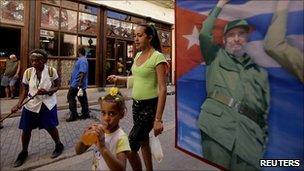Cuba begins public debate on economic reforms
- Published

What do the Cuban people think?
Cuba has launched a public debate on plans to transform its socialist economy by reducing the role of the state and boosting private enterprise.
Ordinary Cubans are being encouraged to discuss the changes so their views can be taken into account at a ruling communist party congress next April.
The government says everyone should have a free say on the future of Cuba.
But it also insists that the "socialist character" of Cuba's political system will not change.
Under the headline "It is the people who decide", the official Communist Party newspaper Granma said everyone in Cuba should take part in the economic debate
It urged people to discuss the changes through Communist Party organisations, trade union meetings and community groups.
"Nobody should remain with an unexpressed opinion, much less be prevented from expressing it," it said.
"At stake is the future of the Cuban nation."
However, Granma also stressed that the "socialist character" of Cuba's political and social system was "irrevocable."
Economic problems
The three-month debating period is presented as the opportunity for the public to participate in decisions to be taken at the ruling communist party's sixth congress in April, the first to be held in 14 years.
President Raul Castro called the congress in November, saying it would "concentrate on solving problems in the economy and updating the Cuban economic model."
But many details of the economic changes have already been announced, so it is not clear how much influence the public debate will really have.
In September, President Castro announced plans to lay off around up to a million state employees - about a fifth of the workforce - and encourage them to find work in the private sector.
Half of those posts are to go by the end of March, just weeks before the planned congress.
Restrictions on private enterprise are being eased, with small businesses allowed to employ staff, borrow money, and sell services to government departments.
They will also have to pay tax.
Thousands of Cubans have already been given licences to set up private businesses, and more are registering every week.
Since taking over from his brother Fidel in 2006, Raul Castro has taken steps to reduce the state's almost total control of the economy, which has has been gripped by a severe crisis in recent years.
It has suffered from a fall in the price for its main export, nickel, as well as a decline in tourism.
Growth has also been hampered by the 48-year US trade embargo.
- Published9 November 2010
- Published26 October 2010
- Published14 September 2010
- Published2 August 2010